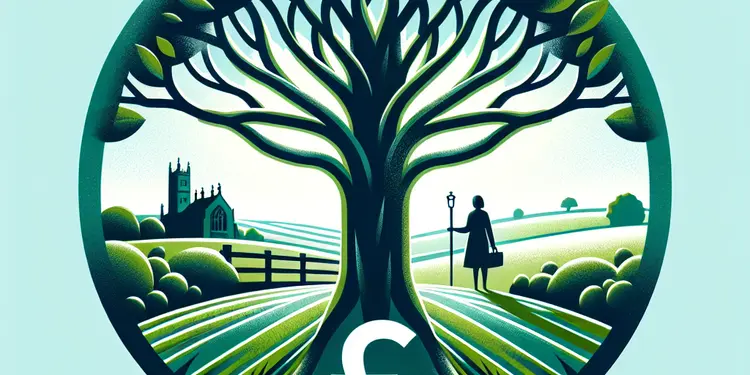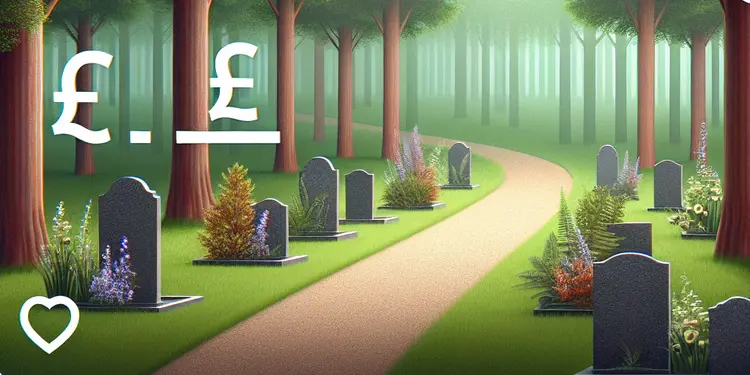
Find Help
More Items From Ergsy search
-

Alternative Burial Methods
Relevance: 100%
-

What are the different methods of burial available in the uk?
Relevance: 85%
-

Woodland and Natural Burials
Relevance: 59%
-

Do I need a coffin for a natural burial?
Relevance: 58%
-

What is a traditional ground burial?
Relevance: 58%
-

Are woodland burials legal in the UK?
Relevance: 58%
-

Can a ground burial be held at any time of the year?
Relevance: 57%
-

What environmental considerations are there for ground burials?
Relevance: 57%
-

Is embalming allowed in natural burials?
Relevance: 57%
-

What is a burial certificate?
Relevance: 56%
-

What is a woodland burial?
Relevance: 56%
-

Traditional Ground Burials
Relevance: 55%
-

What is the difference between a woodland and natural burial?
Relevance: 55%
-

Are woodland burials environmentally friendly?
Relevance: 55%
-

Burial at Sea
Relevance: 54%
-

Is embalming required for ground burial in the UK?
Relevance: 54%
-

Are there specific regulations for ground burials in the UK?
Relevance: 53%
-

Can ashes be scattered at a woodland burial site?
Relevance: 52%
-

How do I choose a woodland burial site?
Relevance: 51%
-

Is cremation more affordable than burial in the UK?
Relevance: 50%
-

How are burial plots marked?
Relevance: 50%
-

How much does a woodland burial cost?
Relevance: 50%
-

Can anyone be buried in a woodland burial site?
Relevance: 49%
-

Can I plant a tree on a woodland burial site?
Relevance: 49%
-

What happens if the woodland burial site is full?
Relevance: 49%
-

Can I reserve a burial plot in advance?
Relevance: 48%
-

How much does a traditional ground burial cost in the UK?
Relevance: 48%
-

Why are council burial fees going up nearly 50% in the UK?
Relevance: 47%
-

What types of memorials are allowed in woodland burial sites?
Relevance: 47%
-

How soon after death can a burial take place?
Relevance: 47%
-

Can I have a funeral ceremony at a woodland burial site?
Relevance: 47%
-

What is the role of a funeral director in a traditional burial?
Relevance: 45%
-

What are the best methods of birth control?
Relevance: 43%
-

What are common methods for making cannabis extract?
Relevance: 38%
-

Three Debt Free Methods in 2023 | Free Debt Calculator Tracker
Relevance: 36%
-

What methods are used to control screw worm populations?
Relevance: 35%
-

What alternative methods exist to screen for colorectal cancer?
Relevance: 30%
-

What are the main methods for testing yourself for colorectal cancer?
Relevance: 30%
-

What is a green or eco-friendly funeral?
Relevance: 28%
-

What is cremation?
Relevance: 27%
Methods of Burial in the United Kingdom
In the United Kingdom, burial practices are diverse and can vary based on personal, cultural, religious, and environmental considerations. The choice of burial method can reflect personal beliefs and can provide a meaningful way to honor and remember a loved one. Here, we explore the different types of burial options available throughout the UK.
Traditional Ground Burials
Traditional ground burials are the most common form of burial in the UK. This method involves interring the body in a cemetery or churchyard. Burials are performed in according to religious rites or secular preferences and offer a wide range of plot selections that can be personalized with markers or headstones. Many families opt for traditional ground burials for their sense of continuity and connection to a specific location.
Woodland and Natural Burials
Woodland and natural burials are gaining popularity as more environmentally conscious options. This method involves burying the body in a designated natural reserve or woodland area. Biodegradable coffins are often used, and graves are left unmarked or with minimal, natural markers. This method seeks to minimize environmental impact and can offer a serene, pastoral resting place.
Cremation and Ash Interment
Cremation is a widely accepted alternative to traditional burials. The remains, in the form of ashes, can be kept in an urn, scattered in a meaningful place, or interred in a columbarium or burial plot. Cremation offers flexibility regarding memorialization and can be less expensive than traditional burials. Many people in the UK choose cremation for its cost-effectiveness and simplicity.
Alternative Burial Methods
Alternative methods include resomation, also known as alkaline hydrolysis, and promession. Resomation involves breaking down the body using a water and alkali solution, reducing it to a liquid and a small amount of ash. Promession is a freeze-drying process that breaks the body into an organic, biodegradable powder. While these methods are relatively new and less common, they provide innovative solutions appealing to those interested in minimizing environmental impact.
Burial at Sea
Burial at sea is an option for those with a connection to maritime traditions. This method requires a specific license from the Marine Management Organisation in the UK. The body, often in a specially constructed shroud or coffin, is immersed in a designated sea burial site. This option may appeal to those who hold a deep affinity for the sea or who have served as part of maritime professions.
Ultimately, each burial method available in the UK carries its unique considerations and benefits, allowing individuals and families to choose the most fitting option to commemorate their loved ones.
Understanding Burial Methods Available in the UK
The UK offers a variety of burial methods to accommodate different religious, cultural, and personal preferences. Choosing the right method is an important decision that can reflect an individual's beliefs and desires. Below are some of the most common burial options available in the United Kingdom today.
Traditional Burial
Traditional burial is the most common method in the UK and involves interring the body in a casket or coffin in a cemetery. This method is often accompanied by a religious or secular ceremony and provides a place for family and friends to visit. Cemeteries in the UK may be run by local councils, churches, or private companies, each with its own regulations and costs.
Natural Burial
Natural burials, also known as green burials, are becoming increasingly popular among those seeking an environmentally friendly option. This method involves burying the body in a biodegradable coffin or a simple shroud without the use of embalming fluids or artificial grave markers. Natural burial sites are often located in woodland areas where graves are marked with stones or trees rather than headstones.
Cremation
Cremation involves reducing the body to ashes, which can then be kept in an urn, scattered in a meaningful location, or buried in a small plot. It is a cost-effective and flexible option that provides families with more freedom regarding memorialization. Crematoriums across the UK offer services that respect individual wishes and cultural practices.
Burial at Sea
Burial at sea is a more specialized option and is subject to strict regulations in the UK. It involves the body being cast into the sea using an appropriate casket to ensure it sinks quickly. The UK government regulates burial at sea to protect marine environments, with designated sites off the northern Scottish coast, among other locations.
Human Composting
Though relatively new and subject to varying legal acceptance, human composting or natural organic reduction is an emerging method that turns human remains into soil. While not widely available in the UK yet, it aligns with an eco-conscious mindset and may become more accessible as attitudes and regulations evolve.
When choosing a burial method in the UK, it's essential to consider factors like environmental impact, religious and cultural traditions, personal wishes, and cost. Each method has its unique considerations and benefits, allowing individuals to select the option that best aligns with their values.
Ways People Are Buried in the UK
In the UK, there are different ways to bury people. These ways can be chosen based on what people like, their culture, religion, or the environment. Picking how someone is buried can show what's important to them and help remember them. Let's look at some options for burials in the UK.
Traditional Burials in the Ground
The most common way people are buried in the UK is in the ground. This means the body is placed in a special place like a cemetery. People might choose this type of burial because of their religion or personal preference. Families often like ground burials because it keeps a strong link to a certain place. You can also put a stone or marker with the person’s name on the grave.
Burials in the Woods or Nature
Burials in natural settings like woods are becoming more popular. People who care about the environment may choose this. Bodies are buried in nature with simple, eco-friendly coffins. The graves may not have big markers or might have natural ones. This method tries to be gentle to the Earth and can be peaceful and pretty.
Cremation
Cremation is when the body is turned into ashes. The ashes can be kept in a pot, spread in a special place, or buried. Cremation can be cheaper and allows families to decide how they want to remember their loved one. Many people like cremation because it’s simple and flexible.
Different Ways to Be Buried
New ways to bury people include resomation and promession. Resomation uses water and chemicals to slowly dissolve the body, leaving some ashes. Promession freezes the body and turns it into a powder that can go back into the earth. These ways are not very common yet, but some people find them interesting because they are better for the environment.
Burial at Sea
Some people choose to be buried at sea. This needs special permission in the UK. The body is put in a special cloth or coffin and placed in the sea. People who love the ocean or worked on the sea might like this option.
Each burial way in the UK has its own special benefits. This lets people and families pick what feels right to remember their loved ones.
Understanding Burial Choices in the UK
In the UK, there are different ways to bury someone. These choices help meet different religious, cultural, and personal needs. Picking a burial method is a big decision that shows what a person believes and wants. Here are some common ways people in the UK choose to be buried.
Traditional Burial
Traditional burial is the most common choice in the UK. It means putting the body in a casket or coffin in a cemetery. This often comes with a special ceremony. Families and friends can visit the gravesite. Cemeteries can be run by the government, churches, or private businesses. Each has its own rules and costs.
Natural Burial
Natural burials are also called green burials. They are a good choice for people who care about the environment. The body is buried in a coffin that can break down naturally, or in a cloth wrap. There are no chemicals or fake grave markers used. Natural burial sites are usually in forests or natural areas. Markers are often stones or trees instead of headstones.
Cremation
Cremation turns the body into ashes. The ashes can be kept in a special container called an urn, spread in a special place, or buried. Cremation can be cheaper and offers more choices for remembering someone. Many places in the UK offer cremation services that respect different wishes and traditions.
Burial at Sea
Burial at sea is a special choice and has strict rules in the UK. The body is placed in the sea using a special casket that sinks quickly. The UK government makes rules for burial at sea to keep marine areas safe. There are special places for sea burials, like off the coast of northern Scotland.
Human Composting
Human composting is a new way to bury someone. It turns the body into soil. It is not common in the UK yet, but it might become more popular as people think more about the environment. Rules about this are still changing.
When choosing a way to be buried in the UK, think about things like the environment, religious and cultural beliefs, personal wishes, and cost. Each choice is different and offers its own benefits. This helps people pick the way that fits with what they believe in and want.
Frequently Asked Questions
What is a traditional burial?
A traditional burial in the UK involves interring the body in a coffin or casket in a cemetery or churchyard, often accompanied by a graveside service.
What is a natural burial?
A natural burial, also known as a green burial, involves burying the deceased in a biodegradable coffin or shroud in a way that allows the body to decompose naturally and contributes to environmental sustainability.
What are the options for cremation in the UK?
In the UK, cremation involves reducing the body to ashes in a crematorium. The ashes can then be kept, buried, scattered or used in memorials.
What is direct cremation?
Direct cremation is a no-frills cremation option without a formal service beforehand, often chosen for its simplicity and lower cost.
How does a woodland burial work?
A woodland burial involves interring the body in a natural setting like a forest, using biodegradable materials to minimise environmental impact.
Are there any regulations regarding scattering ashes in the UK?
In the UK, you don't need permission to scatter ashes on your own land or private land with the landowner's permission. Scattering ashes in public places may require permission from local councils or other authorities.
What is a burial at sea and how can it be arranged?
A burial at sea is an option where the body is committed to the sea. In the UK, this requires a licence and is often arranged through specialised companies that follow specific regulations.
Can I have a home burial?
Home burials are legal in the UK as long as you have the landowner's permission, and you notify the local environmental health department. There are also specific guidelines that need to be followed.
What is the cost difference between burial and cremation?
Cremation is typically less expensive than burial due to the higher costs associated with purchasing a burial plot, a coffin, and a headstone.
Are there religious considerations for burial in the UK?
Different religions have specific burial practices and rites, which should be respected and considered when planning a burial. Many religious communities have dedicated sections in cemeteries.
What is a mausoleum burial?
A mausoleum burial involves entombing the body above ground in a specially constructed building, which may be a private or a public structure.
Can pets be buried with their owners in the UK?
Generally, pets cannot be buried with their owners in official cemeteries in the UK, but arrangements can sometimes be made for private land burials with specific permissions.
Is embalming required for burial in the UK?
Embalming is not legally required for burial in the UK but may be recommended for viewings or when there is a delay before the funeral.
What is a vault burial?
A vault burial involves placing the coffin in a lined and sealed chamber within a grave, which can help prevent the ground from sinking.
How are eco-friendly burials different from traditional ones?
Eco-friendly burials focus on minimizing environmental impact by using biodegradable coffins, avoiding embalming, and choosing natural burial sites over conventional cemeteries.
What is a traditional burial?
A traditional burial is when someone is put in the ground after they die. Their body is placed inside a box called a coffin. The coffin is then buried in the ground at a special place, called a cemetery. Many people have a ceremony to say goodbye, called a funeral. Friends and family gather to remember the person who died.
Tip: You can use pictures or videos to help understand what a traditional burial is. Talking with someone you trust can also help you learn more.
A traditional burial in the UK is when a person who has died is placed in a special box called a coffin or casket. This box is then put into the ground at a cemetery or churchyard. People often have a small ceremony, called a graveside service, to say goodbye.
Tools like audiobooks or visual aids can help make reading easier. Reading with a friend or family member can also be comforting and supportive.
What is a natural burial?
A natural burial is when someone is buried in a simple way. Nature is looked after. The body is not treated with chemicals. Instead, the body goes back into the earth naturally.
Here are some things that can help you understand more:
- Use pictures or drawings to see what happens in a natural burial.
- Ask someone to explain it to you in simple words.
- Watch videos that show natural burials.
A natural burial is also called a green burial. It means when a person dies, they are buried in a special box or cloth that breaks down naturally. This helps the body to go back to the earth and is good for the environment.
What choices are there for burning a body in the UK?
In the UK, after someone dies, you can choose to burn their body. This is called cremation.
Here are some options for cremation:
- Basic Cremation: The body is burned, and you get the ashes in a simple box.
- Cremation with a Service: The body is burned, and there is a ceremony or service where people can say goodbye.
- Direct Cremation: The body is burned without any family or friends present. It is simple and costs less.
Helpful Tips:
- Ask someone you trust to help you understand the choices.
- Use pictures or drawings to see what happens.
- Talk to a funeral director. They can answer questions.
In the UK, cremation is when a body is turned into ashes in a special place called a crematorium. After that, you can keep the ashes, bury them, sprinkle them in a special place, or use them to remember the person.
What is direct cremation?
Direct cremation is when a person who has died is taken straight to be turned into ashes. There is no big ceremony or funeral before this happens.
Family and friends can have a simple goodbye later if they want.
Using pictures or videos can be a good way to remember the person. Talking with friends or a support group can also help.
Direct cremation is simple and does not have a service before it. It is often chosen because it is easy and costs less money.
How does a woodland burial work?
A woodland burial is when someone is buried in a forest or a natural place.
Here is how it usually works:
- First, the family decides to have a woodland burial.
- They choose a special woodland area where the burial can take place.
- The person who passed away is buried in a simple way, often without a big, fancy coffin.
- Sometimes, a tree or flower is planted where the person is buried.
Woodland burials are good for nature. They help care for the earth.
Helpful tools:
- Ask someone you trust to help you understand more about woodland burials.
- Use pictures or drawings to see how it looks.
A woodland burial is when someone is buried in a forest or woods. The body is placed in the ground using things that break down easily, so it is better for the Earth.
Can you scatter ashes in the UK? Are there rules?
Yes, there are some rules to follow when you want to scatter ashes in the UK.
- You need to ask permission from the landowner before you scatter ashes on private land. This means asking the person who owns the land if it is okay.
- If you want to scatter ashes in a park or on public grounds, check with the local council. The council is the group that takes care of these places.
- If you plan to scatter ashes in rivers or the sea, it is a good idea to check guidelines from the environmental agency. They make sure nature is safe.
It can be helpful to write down your plans and talk to your family. You can also use tools like calendars to remember important dates and things you need to do.
In the UK, you can spread ashes on your own land without asking anyone. If you want to spread them on someone else's land, you need to ask the person who owns it. If you want to spread ashes in public places, like parks, you might need to ask the council or people in charge first.
What is a sea burial and how can you plan one?
A sea burial is when someone is laid to rest in the ocean instead of the ground.
To plan a sea burial, you will need help from people who know how to do it. Family or friends can help you too. Ask them to find the right people or services that can arrange a sea burial.
Using pictures or step-by-step guides can make it easier to understand how a sea burial works. It's okay to ask for help if you need it.
A burial at sea means that the body is placed in the ocean. In the UK, you need special permission for this. There are companies that can help you with everything you need to do.
Can I be buried at home?
Yes, you can be buried at home, but there are rules to follow. Here is how:
- Check the Law: Ask your local council if it is okay.
- Talk to Family: Make sure your family helps to do it safely.
- Find a Good Spot: Pick a place that is safe and away from water.
It might help to ask an expert for advice. You can also use drawings or pictures to help plan.
You can bury someone at home in the UK. You need to ask the person who owns the land if it is okay. You also need to tell your local health office. There are some rules you have to follow.
How much does it cost to bury someone compared to burning the body?
When someone dies, we can choose to bury the body or burn it. We call burning the body "cremation." Burying a body in the ground is often more expensive than cremation.
Here is a simple way to understand the difference:
- Burial: Putting the body in the ground. This usually costs more money because we need a special box, a place in the cemetery, and sometimes a special service.
- Cremation: Burning the body until only ashes are left. This usually costs less money because it is a simpler process.
Ask a helper, like a family member, to explain things more if you need help. Pictures can also help you understand. You can use tools like a calculator to see the numbers and compare the costs.
Cremation costs less money than burial. This is because you have to pay more for burial. You need to buy a piece of land, a coffin, and a headstone for burial.
If reading is hard, you can ask someone to help you read. You can also use tools that read the text out loud for you.
Are there special rules for burying people from different religions in the UK?
There might be special rules or traditions for burying people from different religions. In the UK, you can choose to follow these traditions if you want. Here are some things to think about:
- Some people have special prayers or ceremonies during the burial.
- There might be certain places a person should be buried.
- Some religions have specific times when the burial should happen.
It can help to talk to someone who knows about these traditions, like a religious leader or a community guide.
If you're not sure what to do, you can ask for help from:
- Family or friends who know about your religion.
- A local religious community or center.
- A funeral director, who can explain different options.
Different religions have special ways they do burials. It is important to follow these ways and think about them when planning a burial. Many religious groups have special parts of the cemetery just for them.
What is a mausoleum burial?
A mausoleum burial is a special way to remember people who have died.
It is a building where their bodies are placed after they pass away.
This helps to keep them safe and protected.
If reading is hard, you can ask someone for help or use a text-to-speech tool to hear the words.
A mausoleum burial means putting a body inside a special building above the ground. This building can be for just one family or for many people.
To help understand better, you can:
- Use pictures to see what a mausoleum looks like.
- Ask someone to explain the words you don't understand.
- Read slowly and take breaks if you need to.
Can pets be buried with their owners in the UK?
In the UK, some people want to be buried with their pets. But, you can't always do this.
Rules:
- You need permission from the cemetery.
- Some cemeteries don't allow pets. Check with them first.
What to do:
Ask the cemetery about their rules. It helps to know this before making plans.
If you need help, ask someone you trust to talk to the cemetery for you. They can help you understand what you need to do.
In the UK, people can't usually bury their pets with them in official graveyards. But, if you have the right permissions, you might be able to bury pets on your own land.
Do you need to embalm a body to bury it in the UK?
No, you do not have to embalm a body to bury it in the UK. Embalming is a way to keep the body from looking too different after death. Some people choose it, but it is not a rule.
If you are not sure what to do, you can talk to a funeral director. They can explain things and help you decide.
You can also ask someone you trust for their advice. They might help you understand what is right for you.
In the UK, you don't have to use embalming when someone is buried. But, it might be suggested if people want to see the person before the funeral, or if there will be a wait before the funeral happens.
What is a vault burial?
A vault burial is when someone is buried in a special big box called a vault.
The vault is made of strong material like concrete or stone.
This helps keep the ground around it from sinking.
The vault acts like a safe place for the coffin.
If you find this hard to read, you can ask someone for help. You can also use a tool that reads text out loud.
A vault burial means putting a coffin in a special box. This box is placed in the ground. The box keeps the ground from sinking.
What makes eco-friendly burials different from traditional ones?
Eco-friendly burials are better for the Earth. They use natural things that break down easily. Traditional burials use chemicals and metal or concrete, which do not break down.
Eco-friendly burials are gentle on nature. They help the soil and plants. Traditional burials can hurt nature because they leave things behind that do not go away.
You can ask someone to help you read or understand more about this. It’s also good to look at pictures or videos if that helps you learn better.
Eco-friendly funerals are better for the Earth. They use coffins that break down easily. They don’t use chemicals to preserve the body. They pick special places in nature to bury people instead of regular cemeteries.
Useful Links
This website offers general information and is not a substitute for professional advice.
Always seek guidance from qualified professionals.
If you have any medical concerns or need urgent help, contact a healthcare professional or emergency services immediately.
Some of this content was generated with AI assistance. We’ve done our best to keep it accurate, helpful, and human-friendly.
- Ergsy carfully checks the information in the videos we provide here.
- Videos shown by Youtube after a video has completed, have NOT been reviewed by ERGSY.
- To view, click the arrow in centre of video.
- Most of the videos you find here will have subtitles and/or closed captions available.
- You may need to turn these on, and choose your preferred language.
- Go to the video you'd like to watch.
- If closed captions (CC) are available, settings will be visible on the bottom right of the video player.
- To turn on Captions, click settings .
- To turn off Captions, click settings again.
More Items From Ergsy search
-

Alternative Burial Methods
Relevance: 100%
-

What are the different methods of burial available in the uk?
Relevance: 85%
-

Woodland and Natural Burials
Relevance: 59%
-

Do I need a coffin for a natural burial?
Relevance: 58%
-

What is a traditional ground burial?
Relevance: 58%
-

Are woodland burials legal in the UK?
Relevance: 58%
-

Can a ground burial be held at any time of the year?
Relevance: 57%
-

What environmental considerations are there for ground burials?
Relevance: 57%
-

Is embalming allowed in natural burials?
Relevance: 57%
-

What is a burial certificate?
Relevance: 56%
-

What is a woodland burial?
Relevance: 56%
-

Traditional Ground Burials
Relevance: 55%
-

What is the difference between a woodland and natural burial?
Relevance: 55%
-

Are woodland burials environmentally friendly?
Relevance: 55%
-

Burial at Sea
Relevance: 54%
-

Is embalming required for ground burial in the UK?
Relevance: 54%
-

Are there specific regulations for ground burials in the UK?
Relevance: 53%
-

Can ashes be scattered at a woodland burial site?
Relevance: 52%
-

How do I choose a woodland burial site?
Relevance: 51%
-

Is cremation more affordable than burial in the UK?
Relevance: 50%
-

How are burial plots marked?
Relevance: 50%
-

How much does a woodland burial cost?
Relevance: 50%
-

Can anyone be buried in a woodland burial site?
Relevance: 49%
-

Can I plant a tree on a woodland burial site?
Relevance: 49%
-

What happens if the woodland burial site is full?
Relevance: 49%
-

Can I reserve a burial plot in advance?
Relevance: 48%
-

How much does a traditional ground burial cost in the UK?
Relevance: 48%
-

Why are council burial fees going up nearly 50% in the UK?
Relevance: 47%
-

What types of memorials are allowed in woodland burial sites?
Relevance: 47%
-

How soon after death can a burial take place?
Relevance: 47%
-

Can I have a funeral ceremony at a woodland burial site?
Relevance: 47%
-

What is the role of a funeral director in a traditional burial?
Relevance: 45%
-

What are the best methods of birth control?
Relevance: 43%
-

What are common methods for making cannabis extract?
Relevance: 38%
-

Three Debt Free Methods in 2023 | Free Debt Calculator Tracker
Relevance: 36%
-

What methods are used to control screw worm populations?
Relevance: 35%
-

What alternative methods exist to screen for colorectal cancer?
Relevance: 30%
-

What are the main methods for testing yourself for colorectal cancer?
Relevance: 30%
-

What is a green or eco-friendly funeral?
Relevance: 28%
-

What is cremation?
Relevance: 27%


